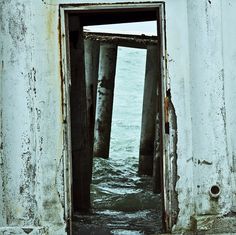You have no items in your cart. Want to get some nice things?
Go shopping
I liked the concealed spaces best. Dark recesses behind the screen, the projection booth, the stale air of the poster store. These parts felt more authentic. There was a moment everyday, after the cleaners had left and before the house music played, where I’d have the room to myself. I’d trace rows of red velvet cushions letting my fingertips loiter a little in the welts in-between. Framed by the melodramatic drape of the curtain, I would sit on the stage and celebrate the thought of what lay beneath.
It was winter when the fierce rain came, bringing customers. They left their umbrellas at the Box Office and puddles on the antique mosaic floor. A palette of scarlet and gold meant the building appeared warm. That morning I’d been assigned the job of selling tickets at the front desk. A fan heater scorched my knees. Still, I was cold to my bones. I pulled the sleeves of my jumper over my hands. We didn’t have a uniform, muted colours was the official advice but our employers weren’t paid enough to care about what we wore. There’d been a cabinet in the foyer since the seventies, which displayed a clumsy history of the cinema through a collection of ticket stubs and photographs. The most conspicuous image showed three usherettes in a line each with solemn-half smiles. It made me sad although I could never understand what was at the root of this feeling, either the silliness of their exaggerated collars, or the compliance implied by their identical patent shoes.
“You’re coming down with something!”
I could tell it was Rosemary by the crack in her voice. I looked up at the familiar terrain of her face, great folds of skin which appeared to both compliment and be in competition with each other. Most of my colleagues found her abrasive buy I was won over by her no nonsense attitude, her casual disregard for pleasantries. She carried a cane and slammed it down like a gavel before continuing.
“Usual.” She sighed.
She always sat in the same seat no matter what the film. She’d watched romantic comedies, historical epics, documentaries and action-packed blockbusters all without passing comment. Why did she visit so regularly? She didn’t seem like your average cinephile and by now I knew the type. It wasn’t a need for company or conversation that brought her on these weekly pilgrimages either.
“There you go, Rosemary. Enjoy your film. Drinks and snacks available from the kiosk.” I’d recited this line so many times my mouth shaped the words without hesitating. As she curled the ticket between arthritic fingers she gave a curt nod of thanks.
“Next, please!”
Days like this would pass without much consequence. I didn’t notice anything out-of-the-ordinary – only the chill of December winds and the distant unease of a gathering storm.
II
The rain continued overnight. Cracks of thunder broke the morning. The cinema’s vintage marquee had seen better days. Arriving to work I could smell damp tobacco rising from discarded cigarette ends at the door. I’d become so used to my surroundings that I hardly noticed them anymore.I stepped back out into the deluge, turned my gaze upwards. Tourists from neighbouring towns were always taking photographs. They were obsessed with the antiquated décor, the sense of history. It was like working in a museum. Eyes fighting slivers of hail, I struggled to make out the NOW SHOWING sign. It was changed weekly, a painstaking task performed by the projectionist whose role extended to handyman among other things. I blinked. The usual set of listings had vanished to leave one bold and unmistakable word.
R E T U R N.
I blinked again. The chill started at the base of my spine and worked it’s way up through my shoulder blades to the nape of my neck. The sign was restored. Merely a trick of the mind, I thought.
III
We were always finding incidental debris like popcorn kernels, kirby grips, a widowed glove, pistachio shells, loose change and once a pair of underwear. Lost items of any value were logged in a file.
“Go through these. Make sure they’re up-to-date.”
My manager Joe was an angry man fond of barking orders, constantly making hollow disciplinary threats, pacing back and forth and waving a stubby dictatorial finger in my direction. He was new to the company having transferred from a multiplex where they sold hot dogs and luminous iced drinks. It seemed he was having trouble adjusting to the slower pace of things.
“I want everything logged. No excuses,” he continued waving several sheets of paper in my face.
I didn’t mind paperwork. It was a welcome break from the chore of regular day-to-day drudgery. We kept all lost property in the basement. There was no real system in place, just a rickety shelf and boxes with indecipherable labels. I began removing them one by one. The air was thick with dust and I found myself choking on the staleness of it. I opened the first box. There was nothing inside. I moved onto the next. Still nothing. With each box I opened the air became denser. By the time I reached the final box, I couldn’t catch a breath. In the cool of my concrete surroundings, I allowed myself to close my eyes for a moment. I pressed my shoes into the floor and it was as though I was sinking in soft remains. My fingers felt the damp chalk of rotting wood. The pungent stink of deterioration was overwhelming. I could taste it, enduring and foul, under my tongue. I dreamt of the cinema often and, as with all conjurings of the mind, it was both the same and drastically different. But this was no dream. It was a nightmarish other, a frightening version of what I knew to be real. Before losing consciousness I saw the light swallowed up by a sinister crack in the wall. I was sure it’d drink me in too.
I awoke to Joe, peering over me. There were layers of dryness in my mouth. My limbs welded to the floor.
“Did you faint? ”
I couldn’t speak yet, although I managed to manoeuvre myself half-upright to take in the scene. I recognised the jaundiced glow of a flickering bulb as the room came into focus. The boxes had returned to the shelves as if I hadn’t touched them.
“I heard the crash. I’ll have to fill out an accident report.”
He held out a hand and I took it gladly. I was in pain. I sipped on a glass of tepid water as he riffled through the first aid kit. Simply a funny turn, I thought. Nonetheless it was with great relief that I accepted his offer to go home early.
III
News of Rosemary’s death came a week later. She’d collapsed suddenly. Unexpected, they said. The little money she had was donated to the cinema. There was going to be a plaque installed to commemorate her as a loyal customer and patron. Despite her general unpopularity, a sombre mood befell the staff. She’d left us and we were all shaken. Even Joe had relented, his usual belligerent attitude replaced with something akin to sensitivity.
“I didn’t realise she used to work here.” He tapped the roof of the cabinet in the foyer.
And there she was. The writing was so miniscule. ‘Jill, Rebecca, Rosemary’ scratched in ink under the half-smiling usherettes. She was tall in her youth, less shrunken. Her hair was shaped in a neat shoulder length bob that was very different from the wiry stack of curls she hid under her hat in old age.
The cinema had been so much a part of her life. The staff speculated about the reason behind her repeat visits. She was lonely. She missed her youth. One romantic theorist suggested she was widowed, and returning to the seat her husband loved. I never pictured her with a husband. Her bond was to the building.
IV
I handed in my notice although I found myself returning to sit in the same seat. Early one Saturday morning I was alone. There were no other customers. The usherette tearing tickets had been called away by a crackle on her radio. I looked up. I no longer savoured the quiet. The screen stared back at me, a malevolent and unblinking eye. I sank into Rosemary’s chair and dared myself to look up once more. The play of shadows contorted the dim light. It fell in sweeping breaks down each aisle like two arms reaching out of the dark.

About Lauren Vevers
Lauren Vevers is a writer based in the North East of England. She has published work in Hobart Pulp, Poems in Which and Litro Magazine amongst others. She tweets @LaurenVevers.




